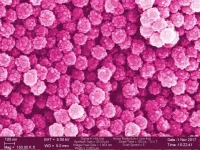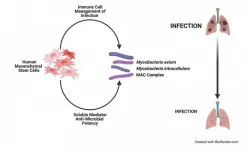(Press-News.org) BOSTON - Researchers at Massachusetts General Hospital (MGH) have identified the protein "signature" of severe COVID-19, which they describe in a new study published in Cell Reports Medicine. "We were interested in asking whether we could identify mechanisms that might be contributing to death in COVID-19," says MGH infectious disease expert Marcia Goldberg, MD, who studies interactions between microbial pathogens and their hosts, and is senior author of the study. "In other words, why do some patients die from this disease, while others--who appear to be just as ill--survive?"
In March 2020, when the first patients with symptoms of COVID-19 began arriving at MGH's emergency department (ED), Goldberg was contacted by her colleague, Michael Filbin, MD, MS, an attending physician and director of Clinical Research at MGH's ED, and lead author of the study. Filbin and Goldberg had earlier begun collaborating with MGH immunologist Nir Hacohen, PhD, to develop methods for studying human immune responses to infections, which they had applied to the condition known as bacterial sepsis. The three agreed to tackle this new problem with the goal of understanding how the human immune system responds to SARS-CoV-2, the novel pathogen that causes COVID-19.
To undertake this study, the MGH team used proteomics, which is the analysis of the entire protein composition (or proteome) of a cell, tissue or organism. In this case, proteomic analysis was used to study blood specimens taken from patients arriving at the hospital's ED with respiratory symptoms consistent with COVID-19. Collecting these specimens required a large team of collaborators from many departments, which worked overtime for five weeks to amass blood samples from 306 patients who tested positive for COVID-19, as well as from 78 patients with similar symptoms who tested negative for the coronavirus. (For more on this extraordinary effort, click here.)
Next, Arnav Mehta, MD, PhD, a postdoctoral researcher at the Broad Institute of MIT and Harvard, was brought on board to oversee interpretation of the complex data produced by the proteomic analysis. Mehta also works in Hacohen's lab, and the two had long been interested in using proteomic analysis of blood as an alternative to biopsies (which are invasive and painful). "We have been asking, What can we learn about what's happening in the body just by looking at protein signatures in the blood?" says Mehta.
The study found that most patients with COVID-19 have a consistent protein signature, regardless of disease severity; as would be expected, their bodies mount an immune response by producing proteins that attack the virus. "But we also found a small subset of patients with the disease who did not demonstrate the pro-inflammatory response that is typical of other COVID-19 patients," says Filbin, yet these patients were just as likely as others to have severe disease. Filbin notes that patients in this subset tended to be older people with chronic diseases, who likely had weakened immune systems.
The next step was to compare the protein signatures of patients with severe disease (defined as those who required intubation or who died within 28 days of hospital admission) with patients with less-severe cases of COVID-19. The comparison allowed the researchers to identify more than 250 "severity associated" proteins. Importantly, notes Mehta, blood was drawn from patients three times (on enrollment, then three and seven days later). "That allowed us to look at the trajectory of the disease," says Mehta. Among other revelations, this showed that the most prevalent severity-associated protein, a pro-inflammatory protein called interleukin-6, or IL-6, rose steadily in patients who died, while it rose and then dropped in those with severe disease who survived. Early attempts by other groups to treat COVID-19 patients experiencing acute respiratory distress with drugs that block IL-6 were disappointing, though more recent studies show promise in combining these medications with the steroid dexamethasone.
However, Hacohen notes that many of the other severity-associated proteins the analysis identified are likely important for understanding why only a portion of COVID-19 develop severe cases. Learning how the disease affects the lungs, heart and other organs is essential, he says, and proteomic analysis of the blood is a relatively easy method for getting that information. "You can ask which of the many thousands of proteins that are circulating in your blood are associated with the actual outcome," says Hacohen, "and whether there is a set of proteins that tell us something."
Goldberg believes that the proteomic signatures identified in this study will do just that. "They are highly likely to be useful in figuring out some of the underlying mechanisms that lead to severe disease and death in COVID-19," says Goldberg, noting her gratitude to the patients involved in the study. Their samples are already being used to study other aspects of COVID-19, such as identifying the qualities of antibodies that patients form against the virus.
INFORMATION:
Goldberg directs the Goldberg Laboratory at MGH, is a professor of Emergency Medicine at Harvard Medical School (HMS) and is an associate member of the Broad Institute. Filbin is an assistant professor of Emergency Medicine at HMS and an associate member of the Broad Institute. Hacohen directs the Hacohen Lab at MGH and is a professor of Medicine at HMS and a member of the Broad Institute. Mehta is a fellow in hematology and oncology at Dana-Farber Cancer Institute and MGH.
The study was supported by the Cystic Fibrosis Foundation Postdoctoral Fellowship; a gift from Sandra, Sarah and Arthur Irving; the American Lung Association (COVID-19 Action Initiative); the Executive Committee on Research at MGH; the Chan-Zuckerberg Initiative; and the Harvard Catalyst/Harvard Clinical and Translational Science Center (National Center for Advancing Translational Sciences, National Institutes of Health Awards).
About the Massachusetts General Hospital
Massachusetts General Hospital, founded in 1811, is the original and largest teaching hospital of Harvard Medical School. The Mass General Research Institute conducts the largest hospital-based research program in the nation, with annual research operations of more than $1 billion and comprises more than 9,500 researchers working across more than 30 institutes, centers and departments. In August 2020, Mass General was named #6 in the U.S. News & World Report list of "America's Best Hospitals."
Wherever scientists look, they can spot them: whether in remote mountain lakes, in Arctic sea ice, in the deep-ocean floor or in air samples, even in edible fish - thousands upon thousands of microscopic plastic particles in the micro to millimeter range. This microplastic is now even considered one of the defining features of the Anthropocene, the age of the Earth shaped by modern humans.
Microplastics are formed by weathering and physicochemical or biological degradation processes from macroscopic plastic products, such as the tons of plastic waste in the oceans. It is unlikely that these degradation processes will stop at the micrometer ...
On September 28, 2018, an inexplicably large tsunami devastated the Indonesian coastal city of Palu and several others nearby. Between the tsunami and the magnitude 7.5 earthquake that caused it, some 4,340 people were killed, making it the deadliest earthquake that year.
The tsunami's waves reached around six meters high, which was a shock to geophysicists who had believed that earthquakes along a strike-slip fault could only trigger far smaller tsunamis for that particular region. Now, new research describes a mechanism for these large tsunamis to form, and suggests that other coastal cities that were thought to be safe from massive tsunamis may need to reevaluate their level of ...
Daegu Gyeongbuk Institute of Science and Technology (DGIST) scientists in Korea have developed algorithms that more efficiently measure how difficult it would be for an attacker to guess secret keys for cryptographic systems. The approach they used was described in the journal IEEE Transactions on Information Forensics and Security and could reduce the computational complexity needed to validate encryption security.
"Random numbers are essential for generating cryptographic information," explains DGIST computer scientist Yongjune Kim, who co-authored the study with Cyril Guyot and Young-Sik Kim. "This randomness is crucial for the security of cryptographic systems."
Cryptography is ...
University of South Australia researchers have identified an enzyme that may help to curb chronic kidney disease, which affects approximately 700 million people worldwide.
This enzyme, NEDD4-2, is critical for kidney health, says UniSA Centre for Cancer Biology scientist Dr Jantina Manning in a new paper published this month in Cell Death & Disease.
The early career researcher and her colleagues, including 2020 SA Scientist of the Year Professor Sharad Kumar, have shown in an animal study the correlation between a high salt diet, low levels of NEDD4-2 and advanced kidney disease.
While a high salt diet can exacerbate some forms of kidney disease, until now, researchers did not realise ...
Pioneering neural recordings in patients with Parkinson's disease by UC San Francisco scientists lays the groundwork for personalized brain stimulation to treat Parkinson's and other neurological disorders.
In a study published May 3rd in Nature Biotechnology, UCSF Weill Institute for Neurosciences researchers implanted novel neurostimulation devices that monitor brain activity for many months, with and without deep brain stimulation (DBS) therapy. Pairing the brain recordings with wearable monitors of movement, they identified patterns of brain activity corresponding to specific movement abnormalities associated with Parkinson's. Their research provides the first ...
HOUSTON - Researchers have found the right formula for mixing a cement that does double duty as a structural material and a passive photocatalytic water purifier with a built-in means of replenishment: simply sand down the material's surface to refresh the photocatalytic quality.
They found this recipe using a few very precise physical laboratory experiments whose data were then greatly amplified using a computational method called combinatorics that tested thousands of combinations of cement composites and their photocatalytic qualities.
The results, say the researchers from C-Crete Technologies and Rice University, indicate ...
Blood may seem like a simple fluid, but its chemistry is complex. When too much potassium, for instance, accumulates in the bloodstream, patients may experience deadly irregular heart rhythms.
Cardiovascular scientists at Virginia Tech's Fralin Biomedical Research Institute at VTC are studying why.
In a new study, published in Pflügers Archiv European Journal of Physiology, the research team led by Steven Poelzing, associate professor at the institute, describes how subtle changes in potassium, calcium, and sodium levels regulate heartbeats.
Poelzing ...
DALLAS (May 3, 2021) - Researchers from the Center for BrainHealth® at The University of Texas at Dallas are investigating a potential new early indicator of the decline toward Alzheimer's disease: measuring the energy metabolism of the living human brain using cutting-edge imaging techniques.
The scientists devised a unique way to illustrate energy consumption and reserves in the brain with phosphorus magnetic resonance spectroscopy using an ultra-high-field 7 Tesla MRI scanner. Their results suggest that neurological energy metabolism might be compromised in mild cognitive impairment (MCI), the stage of decline between healthy ...
A study published today in Nature Communications shows that the drug rucaparib has been effective in treating certain types of ovarian cancers if used early in treatment, after a diagnosis, and before the cancer cells build up a resistance to chemotherapy.
Rucaparib is in a relatively new class of drugs - Poly(ADP-ribose) polymerase or PARP inhibitors - which have been approved for therapy in ovarian cancers. This study provides insights into both how the cancers resist treatments, and which patients may respond favorably to the drug, said lead author Dr. Elizabeth Swisher, a UW Medicine ...
Durham, NC - A study released today in STEM CELLS Translational Medicine offers hope for those suffering from a chronic, difficult to treat condition called non-tuberculous mycobacteria (NTM) lung infection. The study describes how researchers at Case Western University developed a new model of NTM lung infection and then used it to show how effective human mesenchymal stem cells (hMSCs) are in treating this condition - and even which donor cells might be best for doing so.
"The potential to use human mesenchymal stem cells to treat difficult lung infections is promising," said Anthony Atala, M.D., Editor-in-Chief of STEM ...




